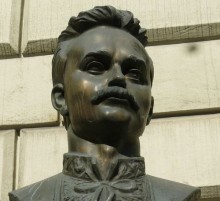The argument about accusing Franko of anti-Semitism and the issue of taking down memorials in Vienna has finally come to the logical end. The doctoral college has already prepared a review of Christa Zoechling’s article, which will be used by the Vienna City Council while deciding the fate of Franko monuments in Vienna. In the article “‘Humanitarian’ provocation. Who benefits from it?” (November 5, 2013, The Day’s issue No. 68) we already wrote about the abovementioned situation. Wolf Dietrich HEIM, Ambassador of the Austrian Republic to Ukraine, thanked The Day for a balanced and professional article and wished for “Austrian magazines to reach the same level.” Besides, he provided unique information, the yet unpublished review of the doctoral college “Austrian Galicia and Its Multicultural Heritage” on Zoechling’s article in the weekly Profil. We are publishing its full version:
“Review of an article ‘Dispute on Monuments to Ukrainian National Heroes’ by Christa Zoechling for the weekly Profil, published on October 21, 2013.
“On October 24 and 25, 2013, a conference ‘Ivan Franko and the Jewish Question in Galicia’ took place at the Vienna University. Ukrainian writer Ivan Franko (1856-1916), in whose honor a memorial plaque was installed 20 years ago on the university wall, became the starting point of the conference. Doubts were expressed about the appropriateness of this plaque, and the article mentioned above is based on an interview with a representative of a group of critics. The Vienna University treated these doubts seriously from the very beginning and therefore commissioned the Institute for Slavic Studies and the university-based and funded by the Science Foundation doctoral college ‘Austrian Galicia and its Multicultural Heritage’ to carry out a scientific conference. Famous figures from Ukraine, Poland, the US, Israel, and Austria were invited to participate in it. They discussed the topic in detail in 10 reports. The fact that Franko’s rich literary heritage, published in 50 volumes, contains anti-Semitic expressions was not disputed. However, an opinion was reached that these expressions do not occupy the central position in Franko’s works and must be viewed each in its corresponding context. Such opinion was based on the fact that anti-Semitic expressions could be counterweighed by more numerous favorable references to Jews. It was also mentioned that Franko wrote articles for Jewish newspapers and was friends with such outstanding personalities as Martin Buber, Nathan Birnbaum, Landau, and it can be seen from the correspondence between them that their relations were full of mutual respect. Incriminating quotations, provided in the Zoechling’s articles, do belong to characters of Franko’s novels. And even though the author bears responsibility for them as well, one must understand the difference between characters’ lines and the author’s direct speech.
“Based on the reports presented at the conference, one conclusion can be made: the article presents a distorted image of Franko, the Ukrainian writer was irresponsibly calumniated. The conference organizers can only express their surprise that not a single attempt to establish contact was made before publishing this article.
“Professor Alois WOLDAN, on behalf of the doctoral college ‘Galicia’”








